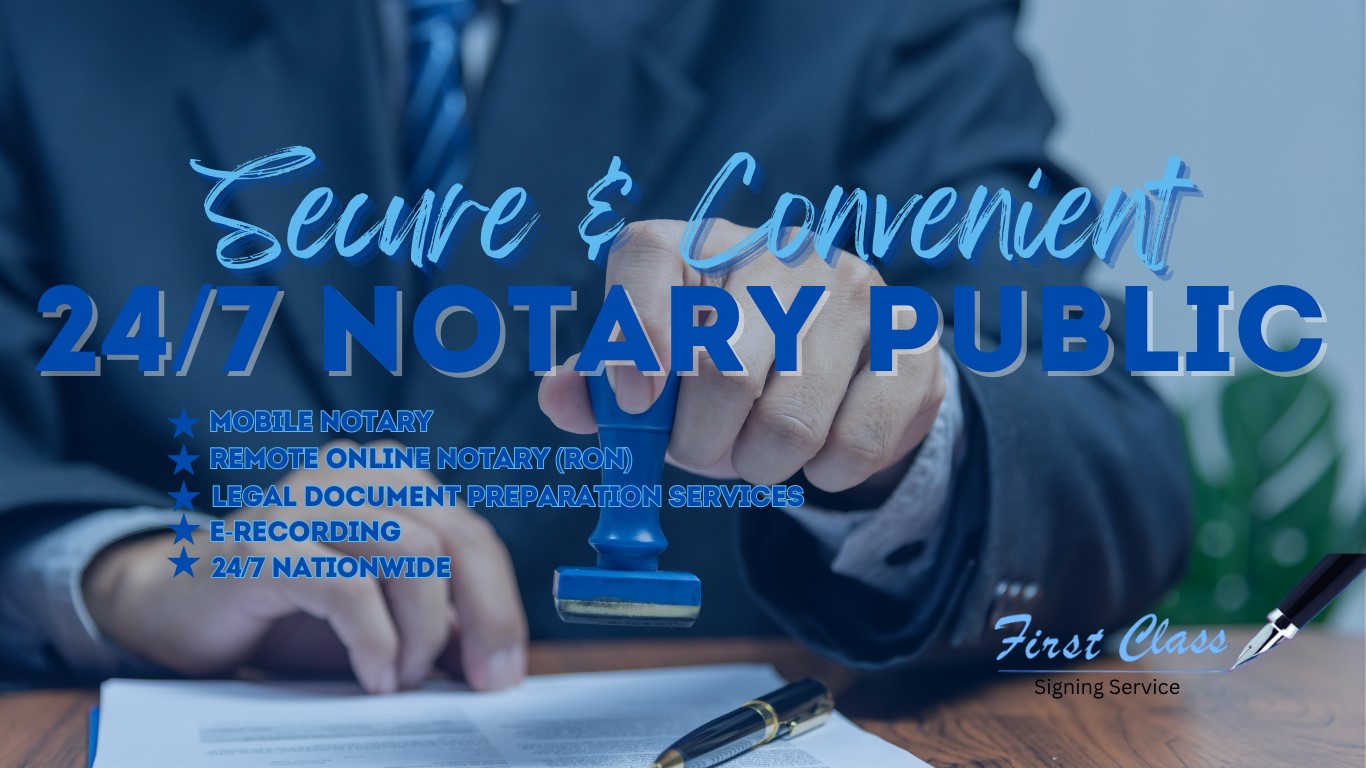24/7 Availability
Same-Day Appointments
Unlocking a new era of efficiency! Effective Oct. 29, 2020, House Bill 2370 established permanent authorization for Pennsylvania-commissioned notaries public to perform remote online notarization (RON) of electronic documents. At First Class Signing, we have an extensive network of licensed mobile and remote online notaries who are standing by to serve customers throughout Pennsylvania.
Mobile Notary vs. Remote Online Notary
All notaries public (mobile, remote, or otherwise) must hold valid and active commission and licensure through the state governments in which they operate. Before the advent of mobile notaries, a trip to the office of a notary public was necessary to notarize any document. Mobile notarization transformed the industry by allowing notaries to travel to a client’s home, place of business, or nearly any other convenient location to perform legally binding notarization services on site.
Digital technology has made the notarization process even easier with remote online notarization (RON). A remote online notary can preside over document signing processes and both validate and authenticate important contractual agreements in the virtual space. Thanks to RON, neither signing party nor the presiding notary need to be in the same physical location, allowing individuals and organizations on opposite sides of the world to conduct official transactions with maximum ease and efficiency.
Find Your Ideal Notary Solutions With RON
Here are some of the most common documents allowed for online notarization in Pennsylvania:
- Power of attorney
- Permission to travel
- Sponsorship letters
- Passport parental consent/ parental consent for travel
- Temporary guardianship agreement
- Medical authorization for minor
- Court documents, quitclaim deeds, deeds of trust, grant deeds and living trust
- Unclaimed property form
- Application for duplicate title
- Affidavit of forgery
- Bill of sale
- Business agreements and contracts
- Construction lien waivers, easements, MOUs, contracts, and leases
- Certifications of official records and tax forms
- Identity theft victim’s complaint and affidavit
Important Reminders:
- Notaries public are NOT attorneys. While a notary is essential if you want to file a family law or civil litigation document, you should never turn to a notary for legal advice.
- Wills and powers of attorney are specialized documents. It is recommended to seek the advice of an attorney-at-law.
- Certificates of title may not be notarized remotely. PennDOT has not implemented electronic titling in Pennsylvania.
- The customer’s electronic device needs to have a camera, microphone and internet access that allows them to communicate with the notary in real-time.
Beyond Convenience: Mobile Notary & Remote Online Notarization Can Help You Save BIG
Beyond the obvious convenience of having a notary public come directly to you (in-person or digitally), mobile and remote online notarization can tremendously impact your financial bottom line. Take, for example, organizations that regularly broker legal agreements or conduct business transactions between parties separated by great geographical distances. They can easily save considerable amounts of money by using RON rather than traveling overseas.
Infirm individuals are also beneficiaries of mobile and remote online notarization. Consider the plight of the bedridden senior citizen who lacks the necessary mobility to go to a notary public office even though he or she needs to file important estate planning or powers of attorney documents.
Is First Class Signing Right for You? Get Answers to Top Questions About Our Pennsylvania Notary Services
Q: Where can I get FCSS services in Pennsylvania?
A: FCSS’ extensive network of mobile and remote online notaries extends throughout the state of Pennsylvania. Our operations are centered in the primary hubs of Philadelphia and Horsham.
Q: What mobile and remote online notaries does FCSS work with in Pennsylvania?
A: All FCSS Pennsylvania notaries have passed all state requirements to obtain and maintain licensure. Among other things, this means that they have passed a comprehensive notary education course and final exam. They must also be free of all disqualifying “character, criminal convictions or prior sanctions.” Furthermore, they are required to hold a 4-year term, $10,000 surety bond and maintain an accurate notary record book with the necessary details.
Discover Your Perfect Match: Contact First Class Signing Today!
If you need a notary, but you can’t (or simply don’t want to) travel to a notary office, you owe it to yourself to take a closer look at mobile and remote online notarization. For guidance on deciding which, if either, of these options is best for you, contact a FCSS representative today.

